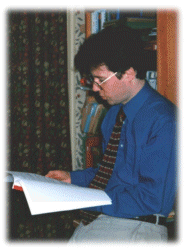

|
About Julian Smart |
 JULIAN A.C. SMART, BSc, PhD
JULIAN A.C. SMART, BSc, PhD
Tel. +44 (0) 131 229 5306
Email julian@anthemion.co.uk
Julian Smart was born on March 27th, 1964 in Nottingham. From 1977 to 1982 he attended Uppingham School, Leicestershire, where he won the Thring prize for applied science for building the sensors and software for a metal-detecting robot.
He attained an honours degree in Computational Science from the University of St Andrews in 1986, after which he worked at STL (STC's research laboratory) on a toolkit to help write formal software specifications. From 1987-89 he worked at the Department of Artificial Intelligence at the University of Edinburgh, writing graphical tools for a collaborative project with Marconi building a sonar navigation system for autonomous underwater vehicles.
In 1989 Julian was employed by the Scottish Crop Research Institute as their first professional computer scientist, investigating how mathematical crop models could be improved by Artificial Intelligence techniques so that they could be used by agricultural advisors. Julianís work showed how a combination of a rule-based formalism, automated model abstraction, and a simple natural language interface, could make such models much more accessible and flexible than previous implementations. He was awarded a PhD in Artificial Intelligence by Dundee University in 1992.
In 1991 Julian joined the Model Based Reasoning group at the Artificial Intelligence Applications Institute, University of Edinburgh where he undertook a variety of consultancy, programming and project management work. In a collaborative project with AEA Technology, whose clients were Shell, Exxon, Texaco and the Health and Safety Executive, Julian helped design and implement a rule-based system for modelling the behaviour of personnel fleeing from an off-shore emergency situation. He built the interface for a successful chemical safety expert system distributed by the Health and Safety Executive in the EC, and has provided the fundamental software for a multi-million pound DTI-funded project called Enterprise. This involved working with IBM, Unilever and Lloyd's Register to produce a task management system to help guide employees through processes.
Julian conceived and developed a programmable diagramming tool called Hardy which is used in many AIAI projects, and is also used outside the AIAI for a wide variety of tasks, including belief network capture, business process modelling, construction of knowledge elicitation tools, an interface for an AI planner, data flow diagramming, KADS analysis, generation of code from object-oriented specifications, database domain model construction, genealogy, and molecular modelling. Hardy was further developed with £250,000 funding from Hitachi Europe Limited from 1993 to 1994, as a tool to be used in-house and also marketed commercially. NeXT and Texas Instruments are currently interested in using Hardy internally.
An example of how Hardy helps AIAI rapidly build successful diagramming applications is the BitKit project, funded by LEEL (Lothian and Edinburgh Enterprise Limited). BitKit is a Hardy application which allows LEEL consultants to model the processes within an organization, collating and visualising employee and product data.
In order to allow Hardy to run on as many platforms as possible, Julian wrote a cross-platform graphical user interface toolkit called wxWidgets, which he released into the public domain via the Internet. wxWidgets is now a well-known and much used system in its own right, distributed on some commercial CD-ROMs, and favourably reviewed in the journal 'UNIX Review'. wxWidgets attracted funding from the large chemical research institute FIZ in Berlin, for porting the software to the Apple Macintosh. wxWidgets is used by many commercial, government and academic organisations around the world, often in preference to established commercial offerings.
In 1996, Julian left AIAI to become a freelance consultant, where he worked on a wide variety of client projects.
From 2000 to 2002 Julian worked at Red Hat writing cross-platform host tools for the eCos deeply embedded operating system.
Julian's programming skills include MS Windows, Motif, UNIX, C++, Lisp, PROLOG, HTML. His outside interests include listening to classical music, antique-hunting, and watching the Simpsons.
Julian is married to the novelist Harriet Smart. They have a daughter, Antonia.
See also:
 Curriculum Vitae
Curriculum Vitae  About Anthemion Software
About Anthemion Software  Past Anthemion clients
Past Anthemion clients  Outsourcing to Anthemion Software
Outsourcing to Anthemion Software  Retooling your MFC applications for Linux
Retooling your MFC applications for Linux  Contacts
Contacts